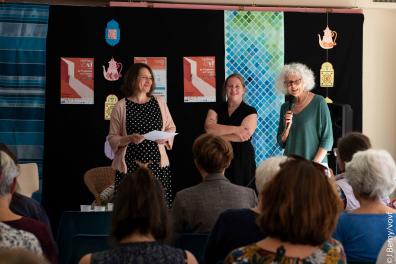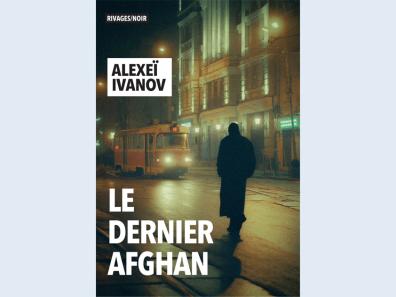Raphaëlle Pache, winner of the Inalco/Vo-Vf 2023 Translation Prize

This prize was presented to her on October 1, 2023 at the festival Vo/Vf by Olivier Mannoni, literary translator and director of ETL (École de traduction littéraire) in the presence of the prize's initiators, Nathalie Carré and Marie Vrinat-Nikolov (Inalco).
French audiences owe Raphaëlle Pache many high-quality translations of contemporary Russian writers, particularly in the genres of crime fiction and science fiction, which are particularly well-suited to uncovering dramas, both individual and collective, and warning of societal problems, political and ecological scandals.
An initial reading of the translations had enabled pre-selection of eight books, which were briefly presented at the award ceremony.
- Le dernier Afghan by Alexeï Ivanov, translated from Russian by Raphaëlle Pache (Rivages/Noir)
- Les yeux de l'Océan by Syaman Rapongan, translated from Chinese (Taiwan) by Damien Ligot (L'Asiathèque)
- Le Serpent blanc by Yan Geling, translated from Chinese by Brigitte Duzan (L'Asiathèque)
- La femme du deuxième étage by Jurica Pavičić, translated from Croatian by Olivier Lannuzel (Agullo)
- La Sterne rouge by Antonythasan Jesuthasan, translated from Tamil (Sri Lanka) by Léticia Ibanez (Zulma)
- Les Portes de la Grande Muraille by S.X., translated from Chinese by Emmanuelle Péchenart (Zulma)
- L'été jaune by Mahir Ünsal Eriş, translated from Turkish by Noémi Cingöz (La Reine Blanche)
- En mémoire de la mémoire by Maria Stepanova, translated from Russian by Anne Coldefy-Faucard (Stock)

The Last Afghan is a great text that has aroused the admiration and enthusiasm of its readers: it evokes, as its title suggests, the "Afghans", those young surviving Soviet soldiers sent to the scrap heap in Afghanistan, where they rub shoulders daily with death, fear and horror. Unloved by the population, they build a micro-society that helps each other in all aspects of daily life, in Gorbatchov's Russia and then post-Soviet Russia. Driven by a veritable breath of fresh air, this is a novel of political and social significance, ample in scope (over 600 pages) and extremely well mastered, with its non-linear structure, numerous flashbacks, incredible scenes and flashbacks to the horrors of guerrilla warfare in Afghanistan. It's also highly topical in its denunciation of what post-communism has retained from the Soviet era, combined with ultra-liberalism (mafia, corruption, the ravages of alcoholism). With his wide range of registers, his slightly Celinian accents and his highly poetic passages, he succeeds in introducing moments of pure beauty into the dark, violent, desperate world he describes: descriptions of landscapes, of young Tatiana and her relationship with Guerman, the main character.
The comparison of the translations with the original texts highlighted the remarkable translation work carried out by Raphaëlle Pache on the dialogues and registers of this text: poetic language, realistic descriptions, images and metaphors striking for their sensuality and tenderness contrasting with the violent world of 1990s Russia, but also colloquial, slang language spoken by different social classes and generations. As this perspective on the two texts points out, "the translation marries the different styles of the original perfectly, following its rhythm and sometimes exuberant flow, understanding its 'subtext' and winks. Alexei Ivanov's rich, abundant writing has found its voice, its echo in Raphaëlle Pache's flamboyant translation."
The Inalco Translation Prize - Vo/Vf Festival
Endowed with 2,500 euros, this prize is designed to highlight the quality of a translator's work, as well as the richness of literature that is sometimes still little known to the general public because it is often less widely distributed. Prose texts (short stories or novels) published in the three years preceding the award ceremony are eligible. Works translated by Inalco members or students are not eligible.
Through this initiative, Inalco wishes to highlight its expertise in translation, as well as the recognition of the work of the translator and his or her publisher in the dialogue between the world's literatures.